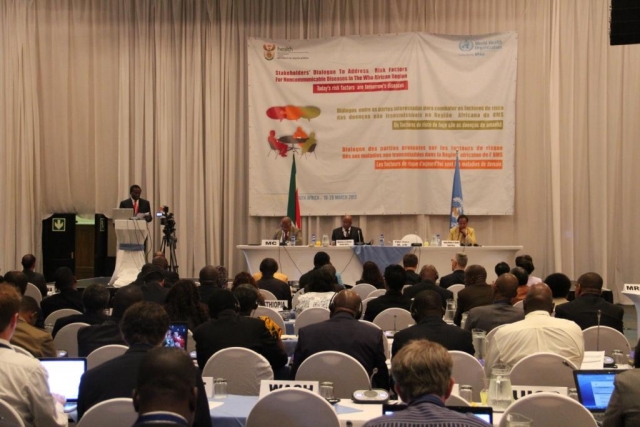Dr Sambo urges firm multi-stakeholder collective action to address noncommunicable diseases in the African Region
 Johannesburg, 18 March 2013 – The World Health Organization's Regional Director for Africa, Dr Luis Sambo has underscored the urgent need to address the rising trend of noncommunicable diseases (NCDs) in the African Region through multisectoral actions.
Johannesburg, 18 March 2013 – The World Health Organization's Regional Director for Africa, Dr Luis Sambo has underscored the urgent need to address the rising trend of noncommunicable diseases (NCDs) in the African Region through multisectoral actions.
Speaking to delegates at the opening session of the Multi-Stakeholder's Dialogue on Addressing Risk Factors for Noncommunicable diseases in the African Region, the Regional Director said: “Sound health policy and preventive actions on the risk factors and their determinants taken at government, community and individual levels have the potential to halt or reverse the rising trend of NCDs”.
He observed that about a third of NCD deaths occur prematurely during the most productive years of life, and this negatively impacts economic development. He cited tobacco use, harmful use of alcohol, unhealthy diet and physical inactivity as some of the risk factors of which policy makers and people are generally ill-informed. Most of the risk factors associated with these diseases are behavioural and lifestyle related and therefore amenable to change.
“Governments and parliamentarians together with representatives of civil society organizations and consumer associations to develop policies, set norms and pass and enact legislation that protect public health and give individuals reliable facts to make informed choices’, he added.
The Regional Director emphasised strengthening the capacity of health services to tackle the clinical aspects of chronic diseases using the primary health care approach including ensuring qualified staff, and making medicines and technologies accessible.
In his remarks, the Minister of Health of South Africa, Dr Aaron Motsoaledi, noted that NCD prevention and cure needs sustainable financing under the objective of universal health coverage. He pointed out that, with limited resources in countries of the African Region, universal health coverage will become even more difficult unless more attention is given to prevention of illness and promotion of health.
“This means seriously tackling the known social determinants of health and the specific risk factors for NCDs. If we fail to do this, with the growing numbers of ill people, our health services will become even more overwhelmed than they already are. We have no option; we must put more effort into prevention of diseases and promotion of health and healthy lifestyles”, he said.
Dr Motsoaledi outlined some of the initiatives and regulations being implemented in South Africa to address NCDs. These include: regulation of salt in processed foods, regulation on the use of trans fat in food production processes, and proposed regulations to further reduce tobacco use.
In particular the Minister noted that the government has taken steps towards establishing the National Health Promotion Commission under the President’s Office, to help address the NCDs burden.
He stressed the importance of up to date data to monitor trends in NCDs and their risk factors as well as setting up mechanisms for countries to share experiences with each other. WHO will facilitate the process in this regard.
The WHO African Region faces a rapidly increasing burden of NCDs alongside the continuing threat of communicable diseases. The main NCDs include cardiovascular diseases, chronic respiratory diseases, diabetes, cancer, sickle-cell anaemia and the consequences of violence and road traffic accidents. Tobacco use, harmful use of alcohol, unhealthy diet and physical inactivity are fuelling the NCD epidemic. These factors act alone or in combination to adversely affect people's health.
The three-day event under the theme: 'Today’s risk factors are tomorrow's diseases' is taking place in Johannesburg, South Africa. It aims to exchange ideas, examine the challenges and explore opportunities to reverse or halt the alarming trends in non-communicable diseases. It is meant to draw out a wide range of views regarding health promotion , support and protection from the adverse effects of tobacco, alcohol, unhealthy diet and physical inactivity.
Around 200 delegates are taking part, including public health experts on NCDs and risks factors, researchers and practitioners, senior officials representing relevant government ministries, consumer organizations, the food industry, intergovernmental organisations and other health stakeholders.
_________________________________________________
For more information, please contact:
Dr Davison Munodawafa, Tel: 00 47 242 39476, email: munodawafad [at] afro.who.int
Collins Boakye-Agyemang, Tel: 00 472 413 9420, email: Boakyec [at] afro.who.int
Eugene Mahlehla, Tel + 27 12 305 77 01 e-mail: Mahlehlae [at] za.afro.who.int
Joe Maila, Tel: 082 887 3581; Email: mailaj [at] health.gov.za or Twitter @mjmaila


